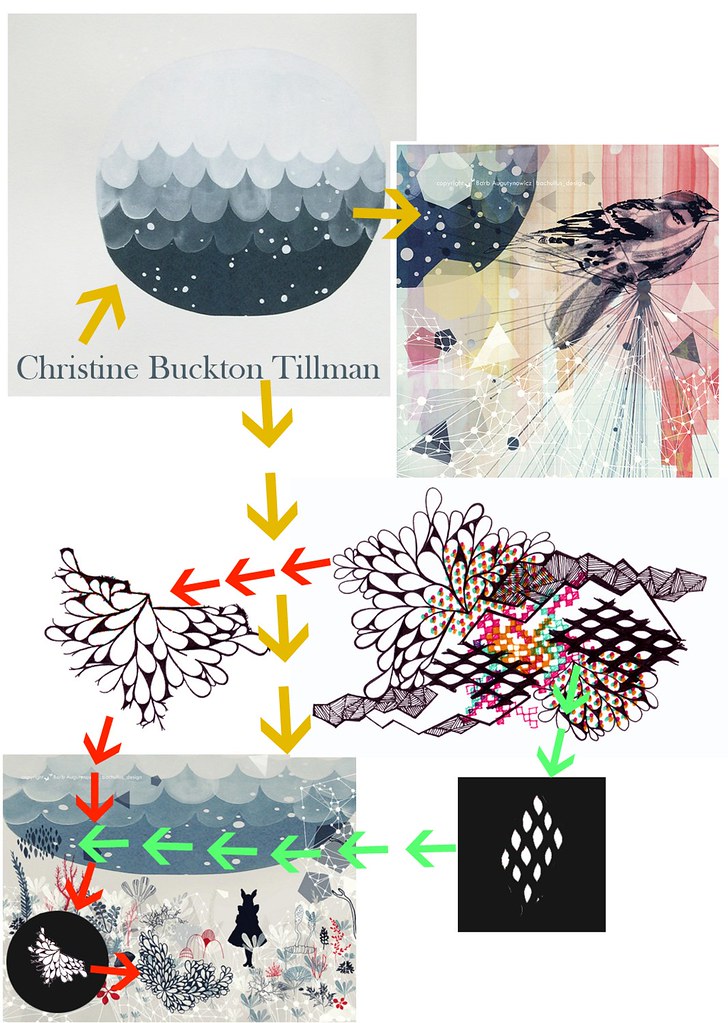I spent yesterday morning documenting the work of an "artist" that incorporated my work into her own. Then I sent a letter asking her to stop using them and to take them out of her portfolio, derivations included. I haven't heard back yet, and am hoping all will end nicely.
I'm not sure how well my note will go over, but I've got documentation and I take design theft seriously (ahem: here,here, here, here). I actually saw Christine Buckton Tillman's work within this artist's portfolio before I recognized my own, Tillman's work was used repeatedly and consistently throughout Artist X's portfolio. Still, there was something that kept itching away at me, but I couldn't put my finger on it. Some of the doodle imagery is pretty generic, and some is very specific. I am certain I see a ton of Betsy Walton, Apak, and . . . who else? Then I recognized some of my own lines. Not similar patterns, but actual lines.
Each artist puts their own imprint into their work, through line quality, style, interests and subject matter. It's the soul of art, and just like fingerprints, work can be very similar, but never quite exact. That fingerprint differentiates the unique and passionate from the deflated and impersonal.
See, this lady takes a lot of artists work and layers it together into a new piece, which is a pretty interesting concept, except that 1) she does so without the original artist's permission or compensation, 2) slathers all of her images with a disgusting amount of copyright and trademark symbols, and 3) posts it all over the internet with captions like, "Prints coming soon." I think I'd like some royalties from those prints.
Maybe she didn't know that a lot of artists sell re-use rights as a way to supplement income. I've done that before a couple times. Other artists might be interested in working together collaboratively, like Apak, Jill Bliss, Betsy Walton, and Yellena did for the show Elemental at Together Gallery. What I'm saying is, there are options, and stealing someones artistic identity is not one of them.
So, let's talk copyright, shall we? Copyright clearly defines an artist's rights with the original work as well as derivatives of an individuals work. It's written about at length. It's wordy, but it's there, and with a little brain churning and turning I think the majority of the world that honors copyright can understand it. If you can't understand it, there's even a reference for self-proclaimed dummies.
So what do you think? Right, wrong, otherwise? How do you define theft versus appropriation? Is there a difference? Let's discuss.


4 comments:
I think it's good to talk about these things. Many artists starting out just don't realize where the boundaries are. In this case, I think she definitely stepped over the line. There is a place for appropriation, but I think it's normally accepted when the appropriated imagery is from a really well known work of art (like the Sistine Chapel, for example) and the artist is very forthcoming about the origin of the appropriated imagery. (This is just my opinion, I'm not sure about the legality of these things...)Best of luck in getting this sorted out!
Argh. I'm angry for you!
I think it's inevitable that some portions of our art might look similar to other pieces we've seen; our brains are inundated with so many images every day that the line between what's ours and what we're merely responding to gets a bit muddled.
However, it's no coincidence when someone is doing something to the extend that this lady is. I don't think you have to go reading legal text to know what's right and what's wrong.
I don't agree concerning appropriation- I would say as far as one should morally go is to respond.
It's such a debatable fine line that artists have to draw when sampling from others' work (thinking of collage especially).
There's so much of it going on lately (think Kanye West! hah!), it seems almost inevitable...the only positive I can see out of this is asking whether this type of sampling process improves the work?
Rambling... but I certainly agree with your position and think that, in the very least, credit needs to be given.
Post a Comment